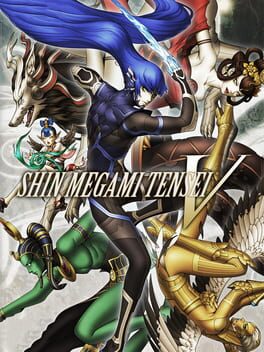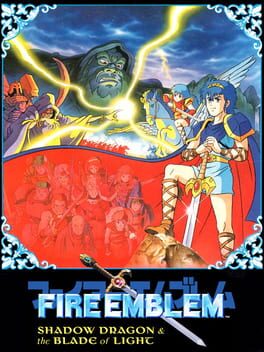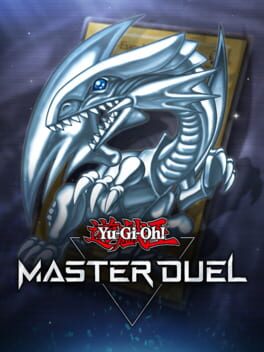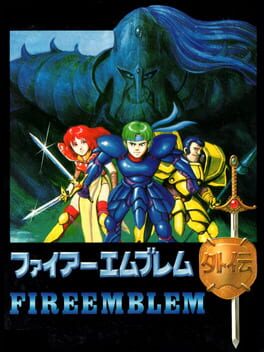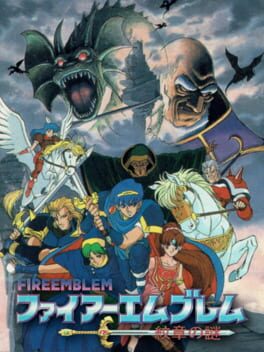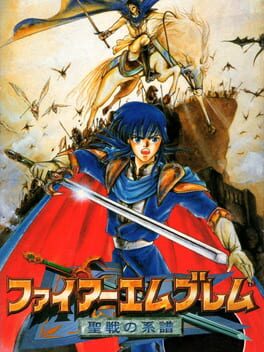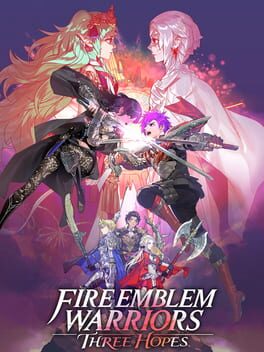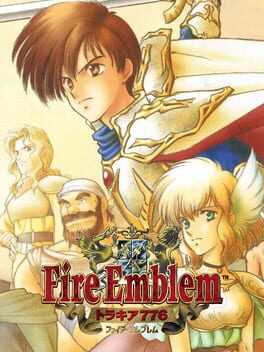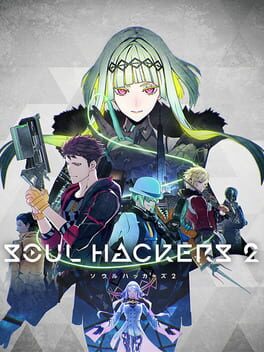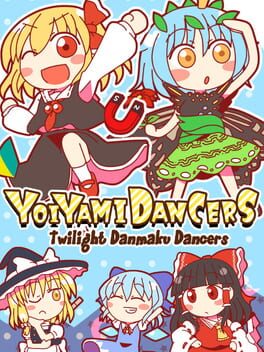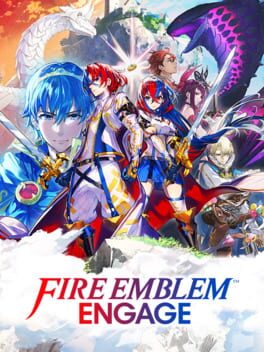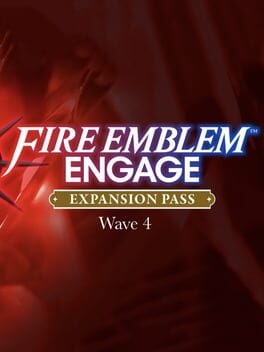Cerb
2021
I should preface this by saying this game is an absolute banger, in terms of the series however I find myself a little more mixed. The series doesn't exactly have a game that encapsulates all the good parts that have come before and Shin Megami Tensei V continues this trend with some incredible leaps forward, and a few stumbling points I had at the back of my mind my whole time playing.
Principally, this series has always been one of the mechanically strongest series in the genre and thankfully V continues that with an excellent system in it's own right, combining the Nocturne systems (one of many aspects it really wants to be Nocturne in) with the conveniences of the 4 duology. Unfortunately, I did find there was a seriously annoying regression with the main character's death equalling a game over, something the previous game had corrected. On the other hand, this game introduces the essence system which adds a whole new layer of customisability and preparation to the strategic gameplay which is a fantastic addition, on a more sentimental level it also allowed me to keep demons I like relevant throughout the whole game, even rewarding me for doing so since demons I kept around for a while often had higher stats than newly fused demons up until I hit the endgame demon 90+ chads.
In terms of atmosphere and world design, I quite enjoyed what this game had to offer. Instead of the dungeons the mainline series was known for, this opts for island pockets of areas connected to each other and it works well for the most part. The designers clearly did put some consideration into how a demon's circumstances dictated the kinda place they would hang out at (mermaids at a lake, Jack Frosts in a warehouse etc.) and it's very ambient in it's own way since the world at play here is also not really anything like the other games in the series, and this is where the world sorta loses me. In the other SMT games, demons at one point or another acclimate their society into the ruins of whichever Japanese city the game takes place in, but in this one they're kinda just hanging around which is strange, with the exception of the final overworld area, and there isn't really much thought put into how these demons function in this society, and yes I am aware that it's because in this entry society is just desert but later revelations make me question this viewpoint as well.
Philosophically, this series might be the weakest to date, Apocalypse aside, the representatives for each faction are somehow weaker than the 1 dimensional guys from the SNES games. It's strange because they're present throughout the entire game, and this entry opts for less extreme worldviews on the Law and Chaos spectrum, so they're views are even less pronounced to me. I actually still genuinely don't understand what the Chaos representative's character even is. SMT might not be a franchise that really focuses on stories, but the front facing characters for alignments has always been an important factor for illustrating how these worldviews align with a human point of view, and this game fails pretty hard in this regard.
And importantly I should note that this game seems really beholden to Nocturne and I don't think it works in it's favour. There are a lot of shared iconography and references which are cool nods but I'd hazard to say it contributes much to the game's own identity, which is already in a questionable state due to it's thematics and philosophy being as weak as they are.
However, these negatives don't really kill the game for me, the gameplay and encounters always had that Shin Megami Tensei seal of quality for me that at least kept the game really good and engaging that I'd just spend my free time plowing through it all as much as I can, and in a year of excellent games I'd still say this manages to stand high amongst the titans of this year. I'd overall recommend this entry as a great entry point for newcomers too, it is the most accessible SMT game for sure, while still maintaining the strengths of SMT as a series.
Principally, this series has always been one of the mechanically strongest series in the genre and thankfully V continues that with an excellent system in it's own right, combining the Nocturne systems (one of many aspects it really wants to be Nocturne in) with the conveniences of the 4 duology. Unfortunately, I did find there was a seriously annoying regression with the main character's death equalling a game over, something the previous game had corrected. On the other hand, this game introduces the essence system which adds a whole new layer of customisability and preparation to the strategic gameplay which is a fantastic addition, on a more sentimental level it also allowed me to keep demons I like relevant throughout the whole game, even rewarding me for doing so since demons I kept around for a while often had higher stats than newly fused demons up until I hit the endgame demon 90+ chads.
In terms of atmosphere and world design, I quite enjoyed what this game had to offer. Instead of the dungeons the mainline series was known for, this opts for island pockets of areas connected to each other and it works well for the most part. The designers clearly did put some consideration into how a demon's circumstances dictated the kinda place they would hang out at (mermaids at a lake, Jack Frosts in a warehouse etc.) and it's very ambient in it's own way since the world at play here is also not really anything like the other games in the series, and this is where the world sorta loses me. In the other SMT games, demons at one point or another acclimate their society into the ruins of whichever Japanese city the game takes place in, but in this one they're kinda just hanging around which is strange, with the exception of the final overworld area, and there isn't really much thought put into how these demons function in this society, and yes I am aware that it's because in this entry society is just desert but later revelations make me question this viewpoint as well.
Philosophically, this series might be the weakest to date, Apocalypse aside, the representatives for each faction are somehow weaker than the 1 dimensional guys from the SNES games. It's strange because they're present throughout the entire game, and this entry opts for less extreme worldviews on the Law and Chaos spectrum, so they're views are even less pronounced to me. I actually still genuinely don't understand what the Chaos representative's character even is. SMT might not be a franchise that really focuses on stories, but the front facing characters for alignments has always been an important factor for illustrating how these worldviews align with a human point of view, and this game fails pretty hard in this regard.
And importantly I should note that this game seems really beholden to Nocturne and I don't think it works in it's favour. There are a lot of shared iconography and references which are cool nods but I'd hazard to say it contributes much to the game's own identity, which is already in a questionable state due to it's thematics and philosophy being as weak as they are.
However, these negatives don't really kill the game for me, the gameplay and encounters always had that Shin Megami Tensei seal of quality for me that at least kept the game really good and engaging that I'd just spend my free time plowing through it all as much as I can, and in a year of excellent games I'd still say this manages to stand high amongst the titans of this year. I'd overall recommend this entry as a great entry point for newcomers too, it is the most accessible SMT game for sure, while still maintaining the strengths of SMT as a series.
At the back of my mind I was always ready to say that Shadowbringers was a fluke, it was preceded by a story that had very little going for it, save for independent storylines divorced from the grander narrative here and there, and to get to Shadowbringers you had the brave the greatest trial of all; boredom from the base game content until Heavensward. However Endwalker embodies everything that made Shadowbringers good and sprinkles in some cheese, and adds the weight of finality to make a story for all the Warriors of Light, new and old, out there to be inspired to keep braving the future, in all it's anxieties and unknowns.
Endwalker isn't the most subtle of narratives, it is very blatant what this expansion is thematically about, and that's okay, it presents it all in a layer of cheese and earnestness that it's impossible not to catch the emotions that the game is throwing at you. It touches base on every previous expansion thematically and spreads a little bit on its own epilogue on each giving all the main story scenes the feeling of a victory long earned. It is a story about moving on, the ideas of the beauty of existence, and how easy it is to take for granted the feeling of existing, the power of emotions and how they can drive us forward when we're at our lowest point, but also how we can let them overwhelm us and fall into despair when unchecked. It is a story about how alienation from your peers can throw you in a direction you never thought you would ever pursue. It is a story about the fundamental disconnects behind people, but the hope that there is always a way to build a bridge against this disconnect. But most of all, it is a story about what a wonderful journey it was, and that the end is what you want it to be, shaped by your own hands and hard work.
There have been games that march to the end before, there have been games that closed off long running story arcs before, but I can't recall any that strive to build off everything that came before and succeed to the degree that Endwalker does. Endwalker is the culmination of a long journey, no matter when you started Final Fantasy XIV. Endwalker caps off the rebirth of Final Fantasy and Square Enix, triumphant and warm, from their lowest point of Final Fantasy XIV 1.0. It takes the success and failures of everything that comes before and invites you back in to love this world, and these characters for making it there with you. Endwalker is the journey to the end with all it's many stops and sights along the way and tells you that the adventure never ends as long as you are willing to traverse there, with your friends and comrades in tow.
Endwalker isn't the most subtle of narratives, it is very blatant what this expansion is thematically about, and that's okay, it presents it all in a layer of cheese and earnestness that it's impossible not to catch the emotions that the game is throwing at you. It touches base on every previous expansion thematically and spreads a little bit on its own epilogue on each giving all the main story scenes the feeling of a victory long earned. It is a story about moving on, the ideas of the beauty of existence, and how easy it is to take for granted the feeling of existing, the power of emotions and how they can drive us forward when we're at our lowest point, but also how we can let them overwhelm us and fall into despair when unchecked. It is a story about how alienation from your peers can throw you in a direction you never thought you would ever pursue. It is a story about the fundamental disconnects behind people, but the hope that there is always a way to build a bridge against this disconnect. But most of all, it is a story about what a wonderful journey it was, and that the end is what you want it to be, shaped by your own hands and hard work.
There have been games that march to the end before, there have been games that closed off long running story arcs before, but I can't recall any that strive to build off everything that came before and succeed to the degree that Endwalker does. Endwalker is the culmination of a long journey, no matter when you started Final Fantasy XIV. Endwalker caps off the rebirth of Final Fantasy and Square Enix, triumphant and warm, from their lowest point of Final Fantasy XIV 1.0. It takes the success and failures of everything that comes before and invites you back in to love this world, and these characters for making it there with you. Endwalker is the journey to the end with all it's many stops and sights along the way and tells you that the adventure never ends as long as you are willing to traverse there, with your friends and comrades in tow.
When I originally played this game I thought it was a rather outdated prototype of one of my favourite series in gaming. Upon a revisit due to it's anniversary for the Switch, and during a drought in terms of series releases, I think it's important to compare this game contextually to it's peers. There's no skating around the fact that this game is just very clunky and barebones, lacking many basic QoL features one might assume a game of this genre might require. However the most important thing that this game manages to achieve is a solid foundation and a good grasp on fundamentals that blueprint the rest of the series from this game. This game has a basic understanding of how to make a map more than just a square with forest tiles littered around, which sounds really basic but if I were to compare this game to the, even future games of the genre, and games I attempted to fill the hole left by the current Fire Emblem drought, I would find that this game achieves better fundamentals than the likes of Shining, Langrisser, Brigandine, Super Robot Wars etc. in just how it recognises that a limited palette of verbs meshes well with the basic but successful map design the game employs.
The actions are simple but it still required a decent degree of strategy, the fact that there are so few actions you can take, combined with the absolutely lopsided balance of everything in the game results in a better experience than a game of it's primitive nature may suggest, its not high art in terms of SRPGS/TRPGS but it manages a decently enjoyable swords and sorcery setting, and an overlarge roster of characters with distinguishable enough characteristics to enable a mechanical attachment to them. This game is honestly worth your time if you're a fan of the series, it establishes conventions and ideas that are still felt to this day meaningfully, while still being a decent game in it's own right.
The actions are simple but it still required a decent degree of strategy, the fact that there are so few actions you can take, combined with the absolutely lopsided balance of everything in the game results in a better experience than a game of it's primitive nature may suggest, its not high art in terms of SRPGS/TRPGS but it manages a decently enjoyable swords and sorcery setting, and an overlarge roster of characters with distinguishable enough characteristics to enable a mechanical attachment to them. This game is honestly worth your time if you're a fan of the series, it establishes conventions and ideas that are still felt to this day meaningfully, while still being a decent game in it's own right.
1992
One of the strangest entries in the Fire Emblem series, yet contributes so much to the series DNA for titles to come. Gaiden eschews the straightforward story of the original for an attempt (the best they could manage for a console like the Famicom) at a more nuanced plot with more moving parts, and to accomplish this they tried to revamp the entire Fire Emblem paradigm to mixed results. The way items works are ok, opting for a more RPG approach with even rare items that have rare drops from certain monsters, and even light dungeon crawling but the real crime here are the maps. Something I realised playing this back to back with the original Shadow Dragon and the Sword of Light is that the prior game was actually fairly competent at making maps that have a bit more strategy to them, despite being a dinosaur of strategy RPGs. Gaiden on the other hand, has absolutely dogshit maps and a fair share of frustration that stems from this, the saving grace is that with all the new systems (namely the changes to magic) the maps can fairly easily be abused around. This game is a strange one, but it's another worthy entry in the catalogue of this series, and from revisiting both Famicom titles I can still say that these two accomplish much more than most, if not all, SRPGs/TRPGs of their era.
This is where Fire Emblem really forms into how we know it today, an attempt at a more complex and nuanced storyline combined with swords and sorcery heroism with a large cast of characters that have more depth breathed into them than previous entries. For its time, its also impressive that it managed to pack a remake of the first game into it (although I've never finished this version of Shadow Dragon).
Mystery of the Emblem's main claim to fame is taking most of the maps from the original Shadow Dragon, adding a few more, then completely recontextualising those maps and adding new kinds of enemies and objectives. I previously mentioned that Shadow Dragon's maps are surprisingly decent, especially for its time, and Mystery of the Emblem reusing those maps keeps the overall map quality at a decent baseline. Other quality of life features from previous games include finally being able to trade items between units, and being able to physically see movement range as opposed to counting out tiles or stretching the movement arrow until it can't move anymore.
The main new addition in this entry is the dismount system, and I find myself a little wanting at this inclusion, certainly it makes mounted units more versatile, and balances them a bit more but I don't think this game leverages the system enough, especially in comparison to a certain famous future entry.
Mystery of the Emblem is notable in how it manages to round out the roots that Shadow Dragon planted to form the game series as we know it today, and viewing it through that historical lens definitely makes this iteration of Marth's Adventure a high quality and still very playable journey today.
Mystery of the Emblem's main claim to fame is taking most of the maps from the original Shadow Dragon, adding a few more, then completely recontextualising those maps and adding new kinds of enemies and objectives. I previously mentioned that Shadow Dragon's maps are surprisingly decent, especially for its time, and Mystery of the Emblem reusing those maps keeps the overall map quality at a decent baseline. Other quality of life features from previous games include finally being able to trade items between units, and being able to physically see movement range as opposed to counting out tiles or stretching the movement arrow until it can't move anymore.
The main new addition in this entry is the dismount system, and I find myself a little wanting at this inclusion, certainly it makes mounted units more versatile, and balances them a bit more but I don't think this game leverages the system enough, especially in comparison to a certain famous future entry.
Mystery of the Emblem is notable in how it manages to round out the roots that Shadow Dragon planted to form the game series as we know it today, and viewing it through that historical lens definitely makes this iteration of Marth's Adventure a high quality and still very playable journey today.
While Mystery of the Emblem was the formation of the series as we know it in a mechanical sense, Genealogy is where the series comes to life, and where it starts to draw me in as one of my favourite video game series ever. An epic fantasy historical narrative spanning two generations, layered and nuanced characters, especially the villains in comparison to the last 3 games, who often find themselves contemplating the value of their chivalry against the their loyalty to the ruling class, this entry tells a grand narrative that is still distinctive and still impressive amongst the console generation it was born in.
The game isn't without its flaws, there is some inkling of narrative aspects that didn't quite make it in due to space or time limitations, such as the Loptyr cult being only explained away as shunned basement dwellers crawling to Loptus for salvation, and the presentation for a lot of the ideas is a bit of a hamfisted explanation given by the tactician you have by the second half of the game, contrasting the first half's exposition via the actual events Sigurd is witnessing. Also the maps are just a huge pain in the ass to navigate, the map design very impressively enlarges into nearly whole continents in a single chapter (it's very well documented you can fit the in-game maps against the world map, and it's geographically one-to-one) but you often find the game wanting you to ride back and forth between locations when enemies decide to send a battalion to your main base and it just makes non mounted units just feel really sluggish, which is a shame because (especially in the second half) the non mounted units were my favourite to use, I suppose that was how IntSys wanted to balance mounted units but it just feels a bit unsatisfying to slowly push your units through a flood of trees that severely hamper movement.
On the more positive aspects, Genealogy's scope affords it to try and experiment with a lot of new futures, many of which became series mainstays. Relationships between units at the player's discretion, rather than the story forcing characters that didn't talk together, is a very welcome addition, mainly because the story frequently rewards this through exclusive conversations between these characters at set points, and the relationships of the first half directly affect characters in the second half. Additionally, the strategic layer takes a huge leap forward with the introduction of the weapon triangle, which adds a lot of nuance to how to tactically engage with the map design, which leads to very satisfying and well done micro-encounters that keep the game feeling satisfying even if there are more annoying macro-objectives. As mentioned prior, the story takes a huge leap forward in terms of portraying its themes, ideas, characters, and general plot with nuance and detail added where possible to create a rich tapestry of a world, truly making it feel like the war narrative anime and media that definitely inspired it.
Genealogy is where the series truly hits its stride, and while I have gripes with future entries here and there, it never really breaks that stride until Fates, so I have a lot of respect for this entry for not only getting the ball rolling on what makes the series so special, but also for being a great distillation into the core ideas that make the series so special to begin with.
The game isn't without its flaws, there is some inkling of narrative aspects that didn't quite make it in due to space or time limitations, such as the Loptyr cult being only explained away as shunned basement dwellers crawling to Loptus for salvation, and the presentation for a lot of the ideas is a bit of a hamfisted explanation given by the tactician you have by the second half of the game, contrasting the first half's exposition via the actual events Sigurd is witnessing. Also the maps are just a huge pain in the ass to navigate, the map design very impressively enlarges into nearly whole continents in a single chapter (it's very well documented you can fit the in-game maps against the world map, and it's geographically one-to-one) but you often find the game wanting you to ride back and forth between locations when enemies decide to send a battalion to your main base and it just makes non mounted units just feel really sluggish, which is a shame because (especially in the second half) the non mounted units were my favourite to use, I suppose that was how IntSys wanted to balance mounted units but it just feels a bit unsatisfying to slowly push your units through a flood of trees that severely hamper movement.
On the more positive aspects, Genealogy's scope affords it to try and experiment with a lot of new futures, many of which became series mainstays. Relationships between units at the player's discretion, rather than the story forcing characters that didn't talk together, is a very welcome addition, mainly because the story frequently rewards this through exclusive conversations between these characters at set points, and the relationships of the first half directly affect characters in the second half. Additionally, the strategic layer takes a huge leap forward with the introduction of the weapon triangle, which adds a lot of nuance to how to tactically engage with the map design, which leads to very satisfying and well done micro-encounters that keep the game feeling satisfying even if there are more annoying macro-objectives. As mentioned prior, the story takes a huge leap forward in terms of portraying its themes, ideas, characters, and general plot with nuance and detail added where possible to create a rich tapestry of a world, truly making it feel like the war narrative anime and media that definitely inspired it.
Genealogy is where the series truly hits its stride, and while I have gripes with future entries here and there, it never really breaks that stride until Fates, so I have a lot of respect for this entry for not only getting the ball rolling on what makes the series so special, but also for being a great distillation into the core ideas that make the series so special to begin with.
A lot better than I was expecting honestly, I love Three Houses, mostly, and despite the fanfic-y nature of this title I find myself strangely compelled to it. For reference, I've only done the Golden Wildfire route where it functions as a better Crimson Flower honestly, the deviations from the original story are well illustrated and easy to infer why Claude deviates so much compared to his Verdant Wind actions, and better yet, people are actually willing to call Claude out on his actions when he does some pretty terrible things, something no-one ever did with Edelgard in Crimson Flower. I will say that the new protagonist, Shez, is pretty flat and their storyline ultimately ends up as an optional footnote in the overall story at large which is pretty jarring, and very strange how barely anyone acknowledges it happened.
Gameplay wise, this is the only Musou to date I haven't bounced off of, it's really fun to be strategic while slapping buttons with some really satisfying movesets, shout-out to Shez's Asura and Byleth's Enlightened One movesets for being the most fun. The territories between missions can get pretty repetitive, but they take like less than 5 minutes once you know what you're doing so I didn't feel all too fatigued by the game until the last chapter, and character and class progression manages to be really satisfying with movesets that change as you advance down your desired true.
Three Hopes functions actually pretty well as a lite version of Three Houses in this regard, the main story isn't as good as most Three Houses routes but it's not bad in it's own right either, the gameplay and class progression is also a small version of Three Houses class progression but manages to capture the same feeling of satisfaction and character growth. The supports exist, and they're pretty good too, although not as good as Three Houses, again. All the redesigns and music is pretty good too. The one thing I'd say is straight up better are Shez and Byleth, with Byleth getting a pretty good set of supports, fun gameplay, and a personality a million times more entertaining than when they were silent. Shez might be pretty cardboard, but at least they're still more interesting than 3 Houses Byleth too. In the end, a game worth your time if you like Three Houses.
Gameplay wise, this is the only Musou to date I haven't bounced off of, it's really fun to be strategic while slapping buttons with some really satisfying movesets, shout-out to Shez's Asura and Byleth's Enlightened One movesets for being the most fun. The territories between missions can get pretty repetitive, but they take like less than 5 minutes once you know what you're doing so I didn't feel all too fatigued by the game until the last chapter, and character and class progression manages to be really satisfying with movesets that change as you advance down your desired true.
Three Hopes functions actually pretty well as a lite version of Three Houses in this regard, the main story isn't as good as most Three Houses routes but it's not bad in it's own right either, the gameplay and class progression is also a small version of Three Houses class progression but manages to capture the same feeling of satisfaction and character growth. The supports exist, and they're pretty good too, although not as good as Three Houses, again. All the redesigns and music is pretty good too. The one thing I'd say is straight up better are Shez and Byleth, with Byleth getting a pretty good set of supports, fun gameplay, and a personality a million times more entertaining than when they were silent. Shez might be pretty cardboard, but at least they're still more interesting than 3 Houses Byleth too. In the end, a game worth your time if you like Three Houses.
2020
Paradise Killer is like, almost there, but as a mystery story I find myself wanting in the execution and structure of the mystery.
I feel like the main issue with Paradise Killer is in it's open world nature, at the very beginning you're given a million leads and the complete freedom to pursue it, while giving a good opportunity to explore the island, it doesn't work as well with any other melding of a genre to an open world as the overabundance of leads tends to lead to a very fatiguing few opening hours as you run through lists of dialogue trees, maybe a few more when accidentally stumbling upon evidence in your trials, leading to more dialogue trees than you had expected prior and having to double back to re-question suspects on what you just learned and it all feels very padded as a result, most of my time was spent running around getting collectibles, or finding vending machines because I needed the currency to find evidence, and the vending machines lead to an extremely vital tool. This is where I think the open world nature of the game betrays its pacing since it never feels like you're really getting anywhere even when you're crushing your leads because of a few main aspects.
Firstly, interrogating suspects in this game is pretty flawed, I dunno how you made going through a list of talking points tedious but it becomes so with the world design, having to walk back and forth, or even if you fast travel its still a significant amount of time spent on commute, on top of all of this though the main issue is that suspects are generally pretty unresponsive, they deflect any accusation thrown at them, even with all the evidence in the world pointing at them doing even a step in someone else's crime, or even if the suspects are friends with you all of them reject and deflect any claim you make resulting in really poor feedback about the progress of the investigation, combine this with social mechanics of all things, requiring you to periodically check in on suspects to get extra clues and dialogue that are essential to finding the whole truth causes a really janky feedback loop, something that a mystery game pretty much requires to be satisfying.
The open world format I suspect was to give way to the fact that you can commence the trial at any time and lay your case down from the minute you touch down, with complete freedom on who you want to accuse, and the Judge's support if you have the evidence for it, which is a really cool concept in theory but in execution it doesn't manage to achieve it's goals because the investigation is extremely backloaded, by the time you get the evidence that I believe will make the story produce any satisfaction you've probably solved almost every lead by that point, so you're probably gonna be doing the trial only at the end anyway unless you really want to see what happens when the guy you suspect isn't the culprit gets executed for every charge anyway.
Paradise Killer is a super stylish game, a treat for the eyes and ears, with clear inspirations to games and works that I really like but forgoes the actual mystery aspect in terms of gameplay and pacing that I'm left a bit mixed on the final experience, the game just kinda ends abruptly. It's almost there though, the real execution and details of the crime are great and it was really satisfying to figure it out ahead of time, even if I feel the characters didn't really acknowledge that I had pretty much figured out most of the answers by a certain point.
I feel like the main issue with Paradise Killer is in it's open world nature, at the very beginning you're given a million leads and the complete freedom to pursue it, while giving a good opportunity to explore the island, it doesn't work as well with any other melding of a genre to an open world as the overabundance of leads tends to lead to a very fatiguing few opening hours as you run through lists of dialogue trees, maybe a few more when accidentally stumbling upon evidence in your trials, leading to more dialogue trees than you had expected prior and having to double back to re-question suspects on what you just learned and it all feels very padded as a result, most of my time was spent running around getting collectibles, or finding vending machines because I needed the currency to find evidence, and the vending machines lead to an extremely vital tool. This is where I think the open world nature of the game betrays its pacing since it never feels like you're really getting anywhere even when you're crushing your leads because of a few main aspects.
Firstly, interrogating suspects in this game is pretty flawed, I dunno how you made going through a list of talking points tedious but it becomes so with the world design, having to walk back and forth, or even if you fast travel its still a significant amount of time spent on commute, on top of all of this though the main issue is that suspects are generally pretty unresponsive, they deflect any accusation thrown at them, even with all the evidence in the world pointing at them doing even a step in someone else's crime, or even if the suspects are friends with you all of them reject and deflect any claim you make resulting in really poor feedback about the progress of the investigation, combine this with social mechanics of all things, requiring you to periodically check in on suspects to get extra clues and dialogue that are essential to finding the whole truth causes a really janky feedback loop, something that a mystery game pretty much requires to be satisfying.
The open world format I suspect was to give way to the fact that you can commence the trial at any time and lay your case down from the minute you touch down, with complete freedom on who you want to accuse, and the Judge's support if you have the evidence for it, which is a really cool concept in theory but in execution it doesn't manage to achieve it's goals because the investigation is extremely backloaded, by the time you get the evidence that I believe will make the story produce any satisfaction you've probably solved almost every lead by that point, so you're probably gonna be doing the trial only at the end anyway unless you really want to see what happens when the guy you suspect isn't the culprit gets executed for every charge anyway.
Paradise Killer is a super stylish game, a treat for the eyes and ears, with clear inspirations to games and works that I really like but forgoes the actual mystery aspect in terms of gameplay and pacing that I'm left a bit mixed on the final experience, the game just kinda ends abruptly. It's almost there though, the real execution and details of the crime are great and it was really satisfying to figure it out ahead of time, even if I feel the characters didn't really acknowledge that I had pretty much figured out most of the answers by a certain point.
This will be the Fire Emblem that defines almost every Fire Emblem to come up until Three Houses, or Echoes if you wanna be a bit more pedantic, and I gotta say, this is easily the least fun and most fun I've had playing through the series history, and the second time I've beaten Thracia which actually affects the experience a lot more than I expected.
Let's start with Thracia's universally agreed positive, the writing and story slaps, and follows a much more nuanced take on concepts and ideas that permeate the series, but especially expands on some of the ideas of the last game that were only hinted out by rather throwaway village dialogue. Something I really appreciated playing this series starting with Shadow Dragon is that this game actually has a lot of variances in objectives, and maps, there's a lot to do and it gives the gameplay a really fresh direction that I really wouldn't feel when I first finished this game fresh off the heels of Binding Blade. The gameplay systems all sound pretty garbage on paper but come together to make a really cohesive and beautiful whole, strangely enough and I can't tell if it's on purpose but the negatives of the individual systems correct a negative for another individual system, for example, the low stat caps make unit growth feel pretty static and removes a bit of the individuality from characters and comes off more as a reduction of characters into functions, however the new fatigue system incentivises you to constantly be using different characters where possible which the low stat caps compliment by not forcing you to play catch up with vastly inferior units.
But here's where the game loses me a little, I'm not too crazy about most of these characters, and while that can be applied to most games that have come prior, it certainly does not apply to Genealogy, and starting this second playthrough the literal day I finish Genealogy made it even more apparent to me, it's not that the characters themselves are the issue, but moreso their presence in the story goes back to how Mystery handled individual characters, with some improvements admittedly, but I never felt, for the most part, they were more than functional parts of my roster. Another issue I had with this game are the maps, this game contains some of the best and worst maps in the series with no in-between. The best maps filled me with adrenaline and hype that I just haven't felt in Fire Emblem since Fates Conquest, while the worst maps made me question if I even liked this game in the first place. Admittedly, this game goes SO much breezier if you're familiar with the game, mechanics, and quirks that you can only get from a second playthrough, which I think is an issue in itself, but man this game introduces Fog of War, one of the worst mechanics in the series, and it's also the worst implementation of it, if I didn't already know how bullshit this implementation was I'd certainly be tearing my hair out every time my screen would be shrouded by the unfeeling black squares of Kaga.
Thracia is a game where I think most people remember the highs, and the highs are pretty damn good, a pretty good case can be made about Thracia being one of the best SRPGs of all time, and I'd agree, but I personally am not a huge fan of this entry given what came before, and what will come after.
Let's start with Thracia's universally agreed positive, the writing and story slaps, and follows a much more nuanced take on concepts and ideas that permeate the series, but especially expands on some of the ideas of the last game that were only hinted out by rather throwaway village dialogue. Something I really appreciated playing this series starting with Shadow Dragon is that this game actually has a lot of variances in objectives, and maps, there's a lot to do and it gives the gameplay a really fresh direction that I really wouldn't feel when I first finished this game fresh off the heels of Binding Blade. The gameplay systems all sound pretty garbage on paper but come together to make a really cohesive and beautiful whole, strangely enough and I can't tell if it's on purpose but the negatives of the individual systems correct a negative for another individual system, for example, the low stat caps make unit growth feel pretty static and removes a bit of the individuality from characters and comes off more as a reduction of characters into functions, however the new fatigue system incentivises you to constantly be using different characters where possible which the low stat caps compliment by not forcing you to play catch up with vastly inferior units.
But here's where the game loses me a little, I'm not too crazy about most of these characters, and while that can be applied to most games that have come prior, it certainly does not apply to Genealogy, and starting this second playthrough the literal day I finish Genealogy made it even more apparent to me, it's not that the characters themselves are the issue, but moreso their presence in the story goes back to how Mystery handled individual characters, with some improvements admittedly, but I never felt, for the most part, they were more than functional parts of my roster. Another issue I had with this game are the maps, this game contains some of the best and worst maps in the series with no in-between. The best maps filled me with adrenaline and hype that I just haven't felt in Fire Emblem since Fates Conquest, while the worst maps made me question if I even liked this game in the first place. Admittedly, this game goes SO much breezier if you're familiar with the game, mechanics, and quirks that you can only get from a second playthrough, which I think is an issue in itself, but man this game introduces Fog of War, one of the worst mechanics in the series, and it's also the worst implementation of it, if I didn't already know how bullshit this implementation was I'd certainly be tearing my hair out every time my screen would be shrouded by the unfeeling black squares of Kaga.
Thracia is a game where I think most people remember the highs, and the highs are pretty damn good, a pretty good case can be made about Thracia being one of the best SRPGs of all time, and I'd agree, but I personally am not a huge fan of this entry given what came before, and what will come after.
When you become an adult, suddenly all the barriers that guided you are gone, whether the barriers were for good or for ill you're left with a strange feeling where before your choices were provided for you, now stretches a horizon of limitless possibilities. It is not a good nor is it a bad thing, but I'll always remember it as being a scary thing and it took me a while to grapple with where my direction was headed once the realisation set in, and the feelings I had of wanting to go back to when life was simpler. This life experience is everything about Xenoblade Chronicles 3 and more, a game which asks questions about the many paths life can take, the choices available to someone, the regret from not taking a choice, and how one can seize their own destiny to move forward from the past, this is easily Takahashi's best work, and the pinnacle of the Xeno-series thus far.
Takahashi forges one of the strongest main casts of characters in a JRPG here, explored thoroughly and meaningfully. One of the biggest merits of the writing of this cast are the frequent discussions everyone has to each other discussing their innermost feelings, insecurities, and doubts. All six members often rarely obscure their problems, and even when they do their counterpart often picks up on any distress immediately and also immediately acts for their friend, it's extremely realistic and heartwarming, ESPECIALLY for a JRPG which normally derives tropes that can be frustratingly obtuse when it comes to social interactions. This step up in character writing is also bolstered by a step up in cutscene direction, the action cutscenes are breathtakingly hype, and when the mood calls for it the lower tempo cutscenes can leave you at the edge of your seat as you watch these kids navigate through the next stage of their lives.
Unfortunately, there has to be some ball dropped when it comes to a Xeno game, and in this case I would say it's the villains, Moebius has a few standout characters in side quests, and like three good characters in the main story, and generally they really just feel like vehicles for the characters to grapple emotional problems around, rather than full characters themselves. It doesn't help that almost every member of Moebius is a sociopathic arrogant manchild, which wears out its welcome pretty quickly. It's very strange to me that they continue to feign arrogance and superiority when by a point in the game our party has killed many of their kind already.
This was the JRPG I didn't know I needed, and I think even if you don't really like the Xeno series, this game is a fantastic entry to the genre as a whole and it feels like a full uncompromised vision of a Monolith Soft game in all its glory, without any of the baggage weighing it down like 2.
Takahashi forges one of the strongest main casts of characters in a JRPG here, explored thoroughly and meaningfully. One of the biggest merits of the writing of this cast are the frequent discussions everyone has to each other discussing their innermost feelings, insecurities, and doubts. All six members often rarely obscure their problems, and even when they do their counterpart often picks up on any distress immediately and also immediately acts for their friend, it's extremely realistic and heartwarming, ESPECIALLY for a JRPG which normally derives tropes that can be frustratingly obtuse when it comes to social interactions. This step up in character writing is also bolstered by a step up in cutscene direction, the action cutscenes are breathtakingly hype, and when the mood calls for it the lower tempo cutscenes can leave you at the edge of your seat as you watch these kids navigate through the next stage of their lives.
Unfortunately, there has to be some ball dropped when it comes to a Xeno game, and in this case I would say it's the villains, Moebius has a few standout characters in side quests, and like three good characters in the main story, and generally they really just feel like vehicles for the characters to grapple emotional problems around, rather than full characters themselves. It doesn't help that almost every member of Moebius is a sociopathic arrogant manchild, which wears out its welcome pretty quickly. It's very strange to me that they continue to feign arrogance and superiority when by a point in the game our party has killed many of their kind already.
This was the JRPG I didn't know I needed, and I think even if you don't really like the Xeno series, this game is a fantastic entry to the genre as a whole and it feels like a full uncompromised vision of a Monolith Soft game in all its glory, without any of the baggage weighing it down like 2.
2022
Probably one of the most unremarkable SMT games in the franchise, with the safest approach taken to one of the most radically unique franchises within the JRPG space. The title languishes in flat, samey combat within overlong dungeons, wrapped around a completely by the numbers budget JRPG story.
Principally, one of main reasons I get into this franchise is the satisfying progression loop of acquiring stronger demons. Most games lets you do this via demon negotiation, and subsequently fusing demons you obtain. However, Soul Hackers 2 finds a way to make that feel worse too, since recruitment is now wrested from player control and given to randomly appearing nodes, of which a random demon emerges which is two layers of RNG just to obtain the demon you want, which is absurd. On top of that, the game ends around the level 60-70 mark so you never get to experience the ceiling of demons in a normal playthrough which is pretty absurd to me. It makes the progression feel stunted, and I find myself pretty attached to certain demons because of gameplay history so it's disappointing that I just didn't get to use them here.
The story is the most painful part here, because its not even bad enough to get like AVGN mad at, because it's just the most stereotypical JRPG plot you can think of in this regard without anything else to hold it up. Character storylines come and go in a flash and it's hard to care about anything outside of just a tenuous attachment to character personalities, of which yeah Saizo and Milady are pretty cool characters but their storylines amount to nothing. The main plot just glides by then switches gears right as the ending is about ready to float on through and before you know it the game is over, nothing interesting to say, no food for thought, probably the most vapid thematics in an SMT game since like, TMS#FE but even that game had something to say about the entertainment industry.
This game really just coasts along on franchise recognition, good aesthetics, the baseline good gameplay as expected from an Atlus JRPG, but with none of the flavour, the substance, or anything that'll make this game worth talking about even years from now, and it really makes me sad because I've been opining for years about how Atlus had regressed in making SMT spin-offs, only to be met with this, I think I'd be happier with just the Persona and mainline SMTs.
Principally, one of main reasons I get into this franchise is the satisfying progression loop of acquiring stronger demons. Most games lets you do this via demon negotiation, and subsequently fusing demons you obtain. However, Soul Hackers 2 finds a way to make that feel worse too, since recruitment is now wrested from player control and given to randomly appearing nodes, of which a random demon emerges which is two layers of RNG just to obtain the demon you want, which is absurd. On top of that, the game ends around the level 60-70 mark so you never get to experience the ceiling of demons in a normal playthrough which is pretty absurd to me. It makes the progression feel stunted, and I find myself pretty attached to certain demons because of gameplay history so it's disappointing that I just didn't get to use them here.
The story is the most painful part here, because its not even bad enough to get like AVGN mad at, because it's just the most stereotypical JRPG plot you can think of in this regard without anything else to hold it up. Character storylines come and go in a flash and it's hard to care about anything outside of just a tenuous attachment to character personalities, of which yeah Saizo and Milady are pretty cool characters but their storylines amount to nothing. The main plot just glides by then switches gears right as the ending is about ready to float on through and before you know it the game is over, nothing interesting to say, no food for thought, probably the most vapid thematics in an SMT game since like, TMS#FE but even that game had something to say about the entertainment industry.
This game really just coasts along on franchise recognition, good aesthetics, the baseline good gameplay as expected from an Atlus JRPG, but with none of the flavour, the substance, or anything that'll make this game worth talking about even years from now, and it really makes me sad because I've been opining for years about how Atlus had regressed in making SMT spin-offs, only to be met with this, I think I'd be happier with just the Persona and mainline SMTs.
2017
An excellent combination of two pillars of what makes Touhou great; music and frantic split second decision making, with an extremely cute and appealing aesthetic, fantastic arrangements and remixes of Touhou tracks and a brilliantly satisfying to learn difficulty curve makes this one of the best Touhou fangames I've ever played.
If you're familiar with Crypt of the Necrodancer, you already have a decent baseline on what the gameplay of this is like, but kept in a player confined grid much like a Megaman Battle Network. Unlike Crypt and Megaman BN though, you're given a wealth of movement options to dodge incoming danmaku and you're absolutely forced to learn how to use these options effectively, the game quickly punishes you for not respecting diagonal directions and using the charge move to propel yourself two spaces and the feeling of exhilaration when you manage to pull off a long chain of complex on the fly decisions WHILE keeping to a beat of a banger song, AND juggling hitting enemies by being in the same row as them is a potent combination that rewards players with an equal mix of adrenaline and satisfaction.
If you're familiar with Crypt of the Necrodancer, you already have a decent baseline on what the gameplay of this is like, but kept in a player confined grid much like a Megaman Battle Network. Unlike Crypt and Megaman BN though, you're given a wealth of movement options to dodge incoming danmaku and you're absolutely forced to learn how to use these options effectively, the game quickly punishes you for not respecting diagonal directions and using the charge move to propel yourself two spaces and the feeling of exhilaration when you manage to pull off a long chain of complex on the fly decisions WHILE keeping to a beat of a banger song, AND juggling hitting enemies by being in the same row as them is a potent combination that rewards players with an equal mix of adrenaline and satisfaction.
2023
A profoundly disappointing experience, Intelligent Systems has displayed that they have the capability to make the peak of strategy RPG gameplay (Fates: Conquest) and that they still have the writers to make even an afterthought of an NES game's story good with lively characters and interestingly explored motivations and relationships (Shadows of Valentia) and has decided to discard all that quality to phone it in for a game that lacks both of these aspects. Coming out after Three Houses doesn't help, a game that pushed the series' character writing and support conversation quality to the next level.
In terms of story, the game I'd consider just below Awakening's, the world they craft is extremely poor and the four kingdoms are given traits that ultimately don't matter in the grand scheme of the narrative since the plot is solely focused on the conflict between the divine dragon side and the fell dragon side, which ruins a lot of the characters motivations since its never illustrated, for example, why Diamant is different from his father, except that Diamant wants to end the constant invasions from Brodia's end. However, King Morion is beloved by everyone, and no one can say any wrong about him as a person nor as a ruler, the same applies to every other currently ruling character in the world which completely deflates every character's aims and goals of trying to make the world a better place when it's already idyllic with only the extremely recent threat of the corrupted meaning anything in the grand scheme of the world.
The plot itself is incredibly weak, with an absolutely poor execution on even simple topics, topics the series has explored before even in it's very first incarnation and succeeded more than this game does. I'm not opposed to the game having simple writing, simple themes, simple characters but this game is no Dragon Quest, there is an almost negative charisma emanating from some of the scenes and dialogue that happen throughout the story with some laughably terrible moments like introducing a character in one chapter and giving them a """tragic""" death in the next chapter only a few minutes later. On a note unrelated to the game's quality, it's completely baffling to me how much leeway is given to this game because it's not attempting to make anything more than the sentai monster of the week that it is, this is a series about heroic fantasy in the context of war and has always managed to hold a level of decorum about it even in the worst stories like Fates.
The characters are especially disappointing in this game, for me a pillar of the series ever since Genealogy has always been to expand side characters through meaningful side conversation which the support system was brilliant for, maybe even being my favourite aspect of the series, and Engage absolutely guts the system, with meaningless drivel that even the tropiest of characters in other games at least topped in quality. This might even be the only Fire Emblem game where I simply did not care about most of the supports in the game, most of them feeling like a waste of my time and an exercise in demolishing any character potential a character might have had. The characters aren't just simple walking cliches played straight, they're worse than that because of the aforementioned problems with the world, but they don't even get to be meaningfully involved with each other with paired endings, an aspect of the series present since Genealogy, being absent which isn't simply shippers not being catered to, but there were paired endings in previous games that weren't just marriage related which bolstered those games' commitments to forging ironclad lifelong bonds through said games' conflicts, something this game barely feels like it does.
On a slightly related note, the hub in this game is absolutely terrible, the characters within never have anything interesting to say at all, something the Three Houses hub was great at. The gameplay in the hub is also atrocious, the place is shit to navigate with functions you'll be returning to frequently being behind separate doors with loading screens resulting in a very clunky experience that makes doing anything in the hub a chore, on top of the dogshit minigames. Who really asked for a timing minigame for temporary buffs? Or a shitty rail shooter?
The level design of the maps are okay at best, while there are some interesting objectives and ideas here and there, they are few and far between as a whole. I wasn't expecting something like the series' highs after seeing footage of the Engage mechanics, but the maps here never hit anything distinctive for me, aside from one chapter. The Engage aspect of the gameplay is a mixed bag, on one hand its fun to steamroll through enemies with your super powered bankais, but most of the game just does not account for these superpowers. For reference I played on Hard Mode, because Fire Emblem games historically have not done the highest difficulty very well with very few exceptions, and I did not have trouble at all past chapter 11 or so, save for doing paralogues under the recommended level. The paralogues are generally where the bulk of the interesting map design stems from, except that most of these mechanics and good design is jacked wholesale from previous games anyway, regardless of whether that is intentional because of the anniversary nature of the game I just think its really sad that the game's best ideas are just from older games.
Finally, I take umbrage with how the game handles the anniversary aspect of it, which bleeds into every aspect of the game. The best way to illustrate my frustration with it is Awakening which was also an anniversary game, and one with a lot more dignity than this game. Engage performs very blatant and in your face pandering that just feels like a mobile gacha game, as opposed to Awakening which relegated overt references to previous games to design aspects or very specific callbacks that worked, whereas Engage is content to just throw out previous game references raw and hope people will bite, which they probably did, but there's just no dignity or elegance to how the game handles its legacy, down to having a fucking gacha of all things.
Fire Emblem Engage is the series indulging in its vices at its worst, and I really hope that this isn't the vibe going forward because this is my favourite video game series, and its really sad to see the future I envisioned at my most cynical after Awakening and Fates actually coming true following two other excellent entries in the series that regained all my good will back.
In terms of story, the game I'd consider just below Awakening's, the world they craft is extremely poor and the four kingdoms are given traits that ultimately don't matter in the grand scheme of the narrative since the plot is solely focused on the conflict between the divine dragon side and the fell dragon side, which ruins a lot of the characters motivations since its never illustrated, for example, why Diamant is different from his father, except that Diamant wants to end the constant invasions from Brodia's end. However, King Morion is beloved by everyone, and no one can say any wrong about him as a person nor as a ruler, the same applies to every other currently ruling character in the world which completely deflates every character's aims and goals of trying to make the world a better place when it's already idyllic with only the extremely recent threat of the corrupted meaning anything in the grand scheme of the world.
The plot itself is incredibly weak, with an absolutely poor execution on even simple topics, topics the series has explored before even in it's very first incarnation and succeeded more than this game does. I'm not opposed to the game having simple writing, simple themes, simple characters but this game is no Dragon Quest, there is an almost negative charisma emanating from some of the scenes and dialogue that happen throughout the story with some laughably terrible moments like introducing a character in one chapter and giving them a """tragic""" death in the next chapter only a few minutes later. On a note unrelated to the game's quality, it's completely baffling to me how much leeway is given to this game because it's not attempting to make anything more than the sentai monster of the week that it is, this is a series about heroic fantasy in the context of war and has always managed to hold a level of decorum about it even in the worst stories like Fates.
The characters are especially disappointing in this game, for me a pillar of the series ever since Genealogy has always been to expand side characters through meaningful side conversation which the support system was brilliant for, maybe even being my favourite aspect of the series, and Engage absolutely guts the system, with meaningless drivel that even the tropiest of characters in other games at least topped in quality. This might even be the only Fire Emblem game where I simply did not care about most of the supports in the game, most of them feeling like a waste of my time and an exercise in demolishing any character potential a character might have had. The characters aren't just simple walking cliches played straight, they're worse than that because of the aforementioned problems with the world, but they don't even get to be meaningfully involved with each other with paired endings, an aspect of the series present since Genealogy, being absent which isn't simply shippers not being catered to, but there were paired endings in previous games that weren't just marriage related which bolstered those games' commitments to forging ironclad lifelong bonds through said games' conflicts, something this game barely feels like it does.
On a slightly related note, the hub in this game is absolutely terrible, the characters within never have anything interesting to say at all, something the Three Houses hub was great at. The gameplay in the hub is also atrocious, the place is shit to navigate with functions you'll be returning to frequently being behind separate doors with loading screens resulting in a very clunky experience that makes doing anything in the hub a chore, on top of the dogshit minigames. Who really asked for a timing minigame for temporary buffs? Or a shitty rail shooter?
The level design of the maps are okay at best, while there are some interesting objectives and ideas here and there, they are few and far between as a whole. I wasn't expecting something like the series' highs after seeing footage of the Engage mechanics, but the maps here never hit anything distinctive for me, aside from one chapter. The Engage aspect of the gameplay is a mixed bag, on one hand its fun to steamroll through enemies with your super powered bankais, but most of the game just does not account for these superpowers. For reference I played on Hard Mode, because Fire Emblem games historically have not done the highest difficulty very well with very few exceptions, and I did not have trouble at all past chapter 11 or so, save for doing paralogues under the recommended level. The paralogues are generally where the bulk of the interesting map design stems from, except that most of these mechanics and good design is jacked wholesale from previous games anyway, regardless of whether that is intentional because of the anniversary nature of the game I just think its really sad that the game's best ideas are just from older games.
Finally, I take umbrage with how the game handles the anniversary aspect of it, which bleeds into every aspect of the game. The best way to illustrate my frustration with it is Awakening which was also an anniversary game, and one with a lot more dignity than this game. Engage performs very blatant and in your face pandering that just feels like a mobile gacha game, as opposed to Awakening which relegated overt references to previous games to design aspects or very specific callbacks that worked, whereas Engage is content to just throw out previous game references raw and hope people will bite, which they probably did, but there's just no dignity or elegance to how the game handles its legacy, down to having a fucking gacha of all things.
Fire Emblem Engage is the series indulging in its vices at its worst, and I really hope that this isn't the vibe going forward because this is my favourite video game series, and its really sad to see the future I envisioned at my most cynical after Awakening and Fates actually coming true following two other excellent entries in the series that regained all my good will back.
